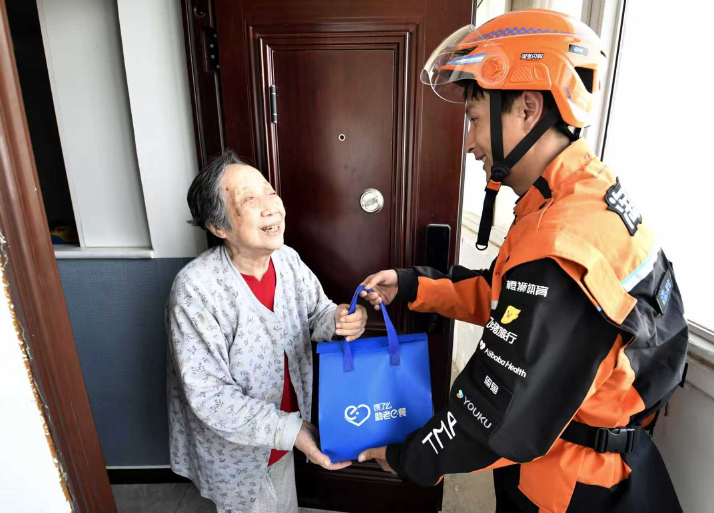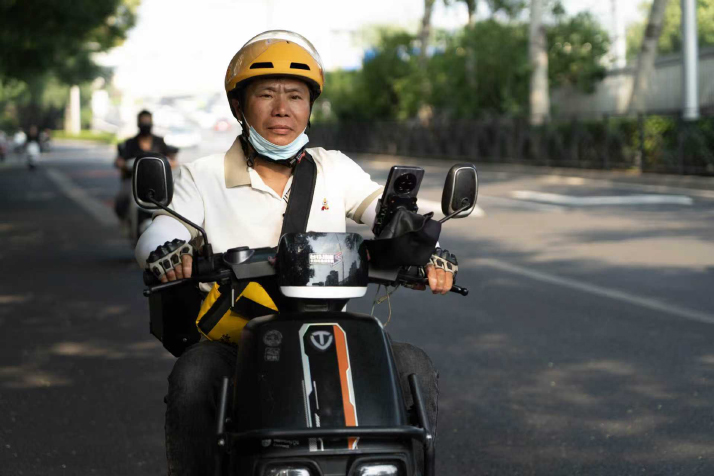| China |
| Building a system to encourage and empower community heroes | |
|
|
 A delivery rider delivers a meal to a senior citizen living alone in Beijing on September 26 (XINHUA)
The recent heroic actions of food delivery riders, who have gone well beyond their usual duties to provide emergency aid and rescue, are gaining public attention. A compelling example is that of Meng Shixiang, a food delivery rider in Beijing, whose bravery in protecting a young girl from harassment went viral online in June. While cycling in the non-motorized lane in the city's Xicheng District, the 14-year-old girl was targeted by a man aggressively pursuing her. Witnessing this perilous situation, Meng immediately intervened. Without hesitation, he stopped his delivery vehicle and positioned himself directly in front of the girl to form a protective shield. He firmly warned the aggressor, "Leave quickly, or I'll call the police!" After the man fled, Meng assisted the girl in moving safely to the roadside. Captured by surveillance cameras, Meng's courageous act resonated widely online. On July 16, Xicheng police imposed a 14-day administrative detention on the offender and subsequently awarded Meng a 2,000-yuan ($280) reward for his bravery. In a separate event, Zhengzhou, Henan Province, experienced a severe, short downpour on the afternoon of August 7. Within hours, vast swathes of the city's main urban areas were inundated with waist-deep water, paralyzing traffic. At the entrance to the First Affiliated Hospital of Zhengzhou University, water levels rose to an alarming 1 meter, trapping dozens of people. In the midst of this crisis, over 10 delivery riders joined forces with traffic police and hospital security guards. Their collaborative efforts were instrumental in transferring the stranded individuals to safety. Two hours later, over 80 people were successfully moved to higher ground. The involvement of delivery riders and couriers in urban emergencies is evolving beyond isolated incidents to become a spirited component of disaster response. Their daily journeys through city streets and alleys grant them intimate knowledge of the terrain, positioning them as an increasingly important emergency response force, whether they are assisting an elderly individual who has fallen down during a downpour or administering first aid to victims of traffic accidents.  Meng Shixiang, who protected a young girl from harassment in June, on his delivery rounds in Beijing on July 22 (XINHUA)
Thriving rescue teams A powerful testament to this is Zhang Baojian, a delivery rider in Wuhan, Hubei Province. On March 25, during a routine delivery, Zhang noticed an unusual crowd, signaling an emergency. Zhang found a 70-year-old man, struck by a car, was lying face down. Certified in first aid by the Red Cross Society of China, Zhang quickly assessed the elder's critically weak breathing and pulse. Upon learning of a need for an automated external defibrillator, a critical device for sudden cardiac arrest, he swiftly came to the injured man's rescue with the defibrillator he keeps with him on his e-bike. While directing bystanders to contact emergency services, Zhang skillfully utilized the defibrillator. He continued to assist medical staff in transferring the senior onto a stretcher upon the ambulance's arrival. Doctors later attributed the successful recovery to his capitalization on the crucial "golden four minutes"—the critical window for life-saving interventions before brain damage occurs—to pull the elder back from the brink of death. Zhang, 34, retired from the military in 2010 and became a delivery rider in 2019. The defibrillator that Zhang used was provided to him by a local organization. Following this widely recognized rescue, Zhang initiated the Jiangcheng Knights volunteer service team—"Jiangcheng" being a nickname for Wuhan—which was established in September. Through numerous training sessions encompassing fire emergencies, cardiopulmonary resuscitation and defibrillator procedures, over 1,000 riders have now acquired first-aid skills, and the volunteer team has executed more than 100 rescues. Beyond Wuhan, the rise of first aid volunteer teams is gaining momentum, transforming them into a vital component of emergency response across various locations. In Yuhang District, Hangzhou, Zhejiang Province, for example, almost 40 delivery riders, having completed rigorous training and earned their defibrillator certifications from the Red Cross, are effectively serving as "mobile paramedics" while on their daily delivery routes. The hurdles at hand The active participation of delivery riders in emergency rescue has enhanced their sense of professional honor and achievement, and many delivery platform companies are willing to organize and train rider volunteer teams. However, despite the growing availability of riders trained in first aid, legal risks related to emergency rescue remain a persistent challenge. "In May, a colleague spotted an elderly woman lying motionless on the road and hesitated to offer aid," Zhang told newspaper Workers' Daily. "He messaged me for assistance." Upon arriving at the scene, Zhang faced a chorus of caution from onlookers: "Don't touch her. What if she blames it on you?" However, drawing on his professional first aid training, he quickly addressed the woman's injuries and summoned an ambulance, ensuring her safe transport to the hospital. "Legally, delivery riders don't face major risks when participating in rescues," Liu Zexi, a lawyer from Beijing Jingsh Law Firm, told Workers' Daily. "Article 184 of the Civil Code, a fundamental law for regulating civil activities, stipulates that a person who voluntarily assists others in an emergency is not liable for any harm caused in the provision of the assistance." The key, he emphasized, "is to educate more riders about this provision and alleviate their concerns." "Legislatures should build upon the Civil Code and the established practices of rewarding and safeguarding the acts of good Samaritans across all regions by actively pursuing the creation of unified legislation specifically focused on such acts," Ban Xiaohui, an associate professor of labor law and social security law at Wuhan University, told Workers' Daily. Such legislation would foster a societal environment that values, encourages and effectively protects those who do such good deeds. "Beyond first aid, we are witnessing delivery riders playing an expanded role in communities, including fire safety inspections and assisting seniors with buying their daily necessities," Ban added. To support this expanding contribution, the government should introduce appropriate rewards. Furthermore, the establishment of special funds to recognize riders involved in related public services is essential. Simultaneously, platforms should be encouraged to offer supplementary support, thus establishing continuous, institutionalized incentives to encourage increased participation in public affairs. Zhang stressed that the most effective motivation is a sense of public recognition, a reward and a commendation of good deeds. "Both tangible and intangible rewards are powerful forms of encouragement and appreciation," Zhang said. Copyedited by Elsbeth van Paridon Comments to jijing@cicgamericas.com |
|
||||||||||||||||||||||||||||||
|